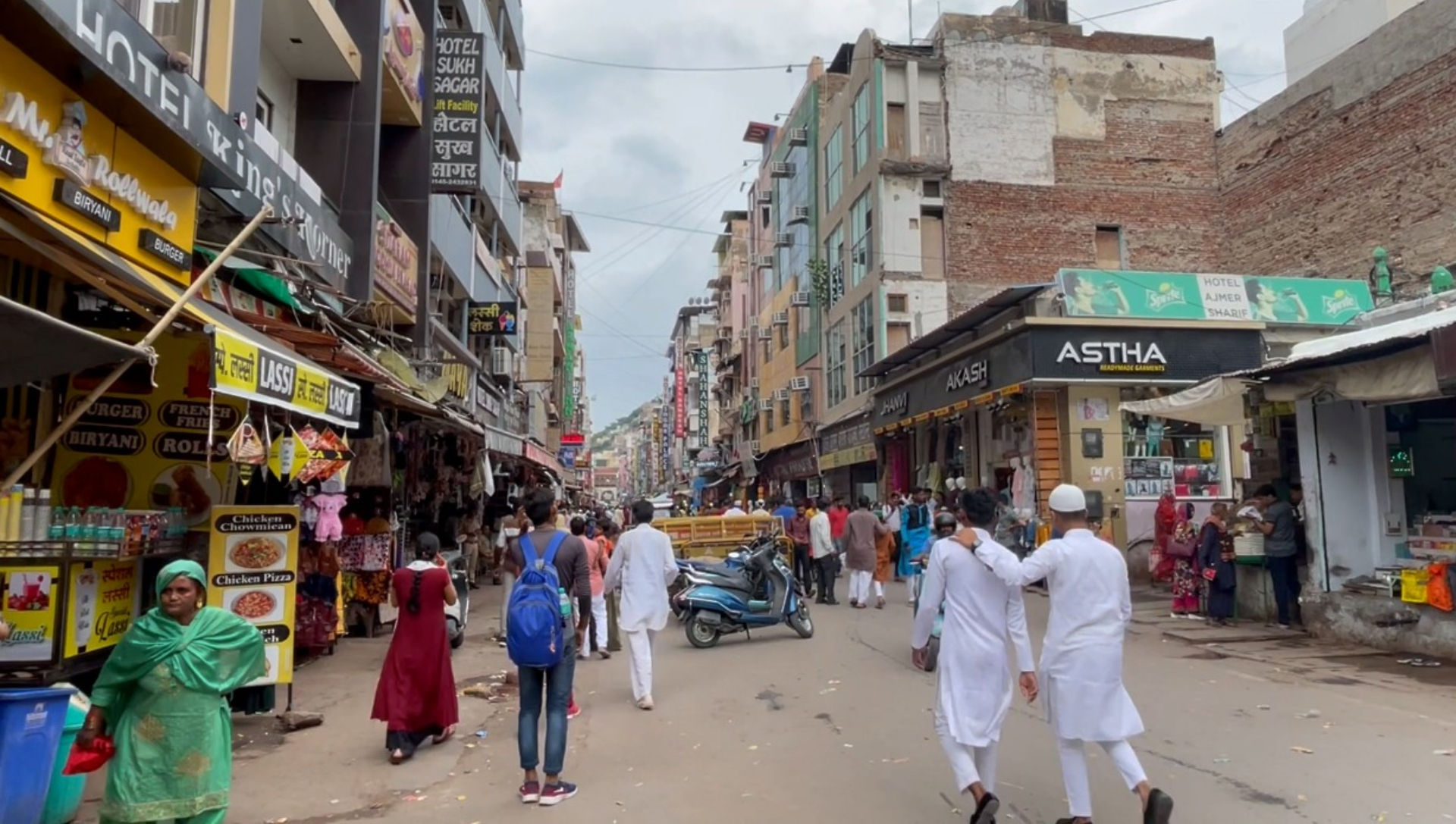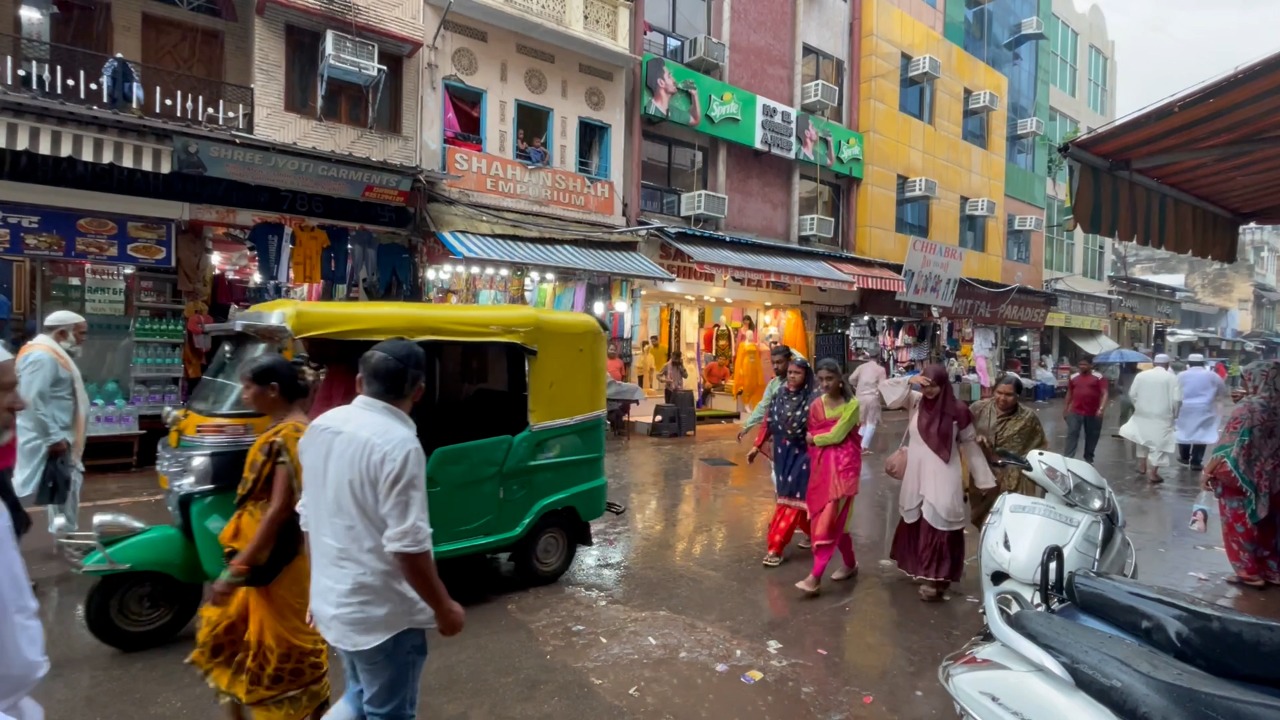AJMER (RAJASTHAN): Pandit Yogesh Kumar Mishra was busy performing the daily rituals at the century-old Annapurneshwar Mahadev Mandir, which is located at the entrance of the Ajmer Sharif Dargah market.
The holy month of Sawan, a religious month for Lord Shiva followers, has begun and Pandit Mishra, a third-generation priest, has started preparations as he ponders over the last couple of weeks that had threatened the harmonious relationship that has been the hallmark of the Ajmer Sharif Dargah.
“It is usually a busy month at this Annapurneshwar Mahadev Mandir. Every day, I perform puja-archana as the crowd gathers at the temple. This year, however, the hate speech incident at Ajmer Sharif has decreased the footfall of people,” Mishra said as Lord Shiva bhajans enthralled the audience in the market.
Before the Dargah market became a bustling tourist spot, a wholesale wheat market used to function at this place. The majority of the wheat merchants were Hindus, who constructed this temple.
After independence, the wheat market was shifted to a different place. Hotels and shops selling sweets, souvenirs and clothes mushroomed in its place, changing the entire face of the market in front of Sufi saint Khwaja Moinuddin Chishti Dargah.
Amid the changing contours, one thing remained constant: The majority of the shops and hotels in the market are still owned by Hindus.
“I never faced any problem in the market. Shivratri festival is celebrated in front of the temple lane that faces the Dargah every year in which all the shop-owners of the Dargah market, including Muslims, contribute. This is the first time I have heard such an incident in my lifetime,” Pandit Mishra said while referring the Ajmer Dargah Khadim Salman Chishti’s comments on social media threatening to kill suspended Bharatiya Janata Party spokesperson Nupur Sharma for her alleged comments against Prophet Muhammad. Another Khadim, Gauhar Chishti had reportedly called for the beheading of Sharma.
Their comments drew widespread criticism as the Sufi saint Khwaja Moinuddin Chishti, who is revered by both communities, gave the message of peace and harmony between the Hindus and Muslim communities of the nation.
More than 85 per cent of the shops and hotels in the Dargah market are owned by Hindus. From delicious food, including Ajmer’s speciality dal-kachoris to Muslim attire including kurta and skull caps and rugs to read namaz, the shops sell all.
One of the poignant images of the market is the sight of a picture of Ajmer Dargah on the wall right beside a small Hindu temple – a common sight in all the shops in the Dargah markets.
In interior lanes on the left side of Ajmer Dargah, old Havelis of the Jain community at Lakhan-Kothri Mohallah, are still standing. Though with time, many Jain families shifted outside the crowded market area, they kept the family heritage. Many of these Havelis have been converted into hotels for the visitors of Dargah.
Suresh Lakhani, 67 years, a rug seller at Dargah market said, “I have spent my entire life in this market but never heard any derogatory comments from Muslims against Hindus. It was shocking for us to hear because more than 70 per cent of visitors to Ajmer Dargah are Hindus. This is a symbol of peace.”
As the video of hate speech given by Gauhar Chishti on June 17 from Dargah’s Nizam gate went viral after the killing of Kanhaiya Lal in Udaipur, panic struck across the nation. In the fear of riots, many tourists, Hindus and Muslims, cancelled their bookings. The lanes became empty and the shop owners who are paying between Rs 50,000 to Rs 1.5 lakh rent, are worried about their expenses.
Hotchand Sirnani, president of the Dargah Market Association, expressed displeasure over the issue. “I was born in this area, lived my entire life here and my hotel will not function without the Ajmer Dargah. This type of speech against a community or chanting slogans doesn’t help anyone. For 15 days the business crashed. In the last two days, the crowd flow has improved, otherwise everyone was worried about their livelihood. Both the communities have to work together or else both will suffer,” Sirnani told The New Indian.
A peace rally was organized by the market association members a few days back to bring back normalcy in the market. Many sessions of the meeting were held between the Dargah Anjuman Committee members and market association members.
“We made it clear to the Anjuman Committee members to put a board that Hindus are not allowed in the Dargah if they don’t want them and then see how the shine of this market and crowd at Dargah falls. This is unacceptable. Hindus control the market and the Anjuman committee controls the internal matter of Dargah, this has always been there. Both Hindus and Muslims are two wheels of this chariot and we have to work together,” said a market association member on condition of anonymity.
Locals explained that the current mood of the nation is communal. “Public Hindu ho ya Musalmaan pasand hi yahi kar rahi hai. (Both Hindu and Muslim public are attracted to such speeches). The members of the Dargah Anjuman committee are religious leaders with great political influence. The speech was made to attract support from conservative Muslims. But you can see the result. Everyone is suffering due to this,” said a resident of Dargah market who does not wish to be named.
Businessmen are hoping that communal flare is controlled so that business can return to normal and Ajmer is again known for a unique combination of religious harmony amongst communities.











